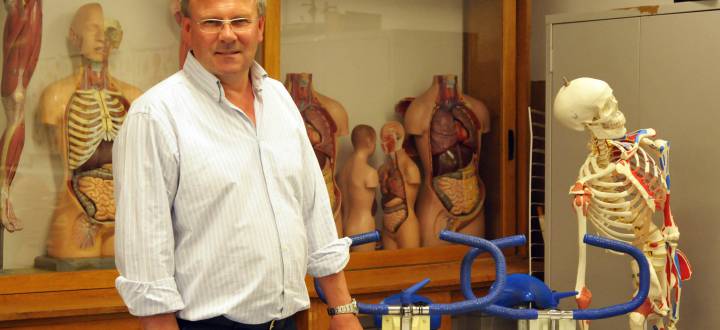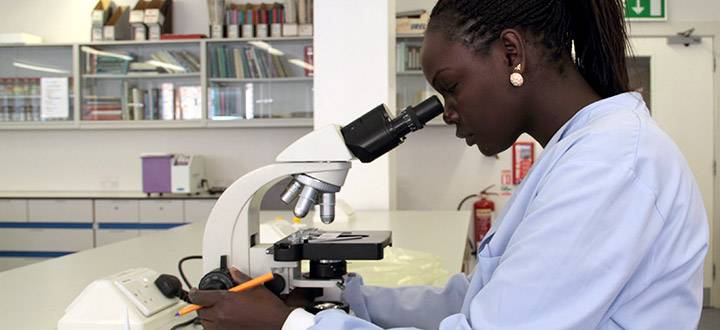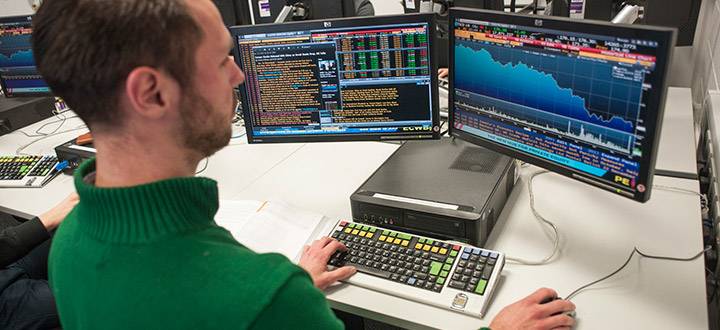Research student case studies
Meet some of our postgraduate research students
Kingston University offers a vibrant and supportive environment in which to study and research. On this page some of our postgraduate research students talk about their areas of research and their experiences at the University.
Collin Mervin Constantine; Faculty of Business and Social Sciences
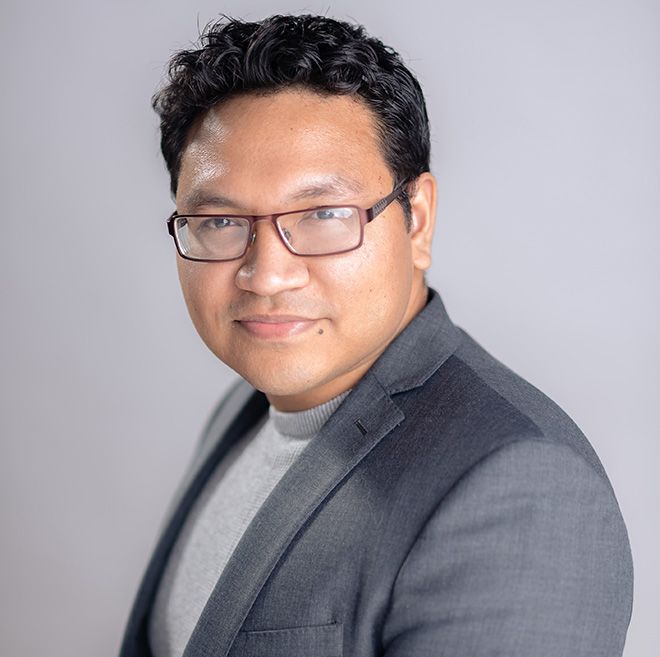
Collin talks about the benefits of a strong research environment: "Kingston University is research driven and thus provides its graduate students with the necessary skills and opportunities to advance their research agendas. At Kingston I have mastered the skill of public speaking through numerous training sessions and conference presentations. The latter were undertaken in many European, Latin American and Caribbean countries, made possible by the generous support of Kingston University. As a consequence, I have access to a rich global network of academics and policymakers, which is critical for collaborative research and policy influence.
My interest in research emerged from the desire to understand the global financial crisis, and Europe presented an intellectual battlefield of competing ideas. The US had more or less found consensus on some sort of mild Keynesianism, while a war of ideas and power struggle waged in Europe. Given the contestation of ideas and ideology, it is foolhardy to interpret the Eurozone crisis from the vantage point of a singular theory or school of thought. Professor Engelbert Stockhammer epitomized the philosophy of testing competing ideas - Kingston University, therefore, was the natural and only choice".

"My dissertation argues that differences in technological capabilities are important determinants of intra-Eurozone current account imbalances. Two free-trading countries with different technological capabilities inevitably lead to relative unit labour cost and trade imbalances. Firms in the leader country set higher mark-ups and in aggregate engender lower unit labour cost. What appears as wage suppression or even price competitiveness masks the fact that a country is on a higher technological frontier. I show that a steady state technology gap and relative unit labour cost are dynamically unstable and, thus, divergence is the norm. It follows that closing the technology gap between Eurozone core and periphery is central to reduce asymmetries like structural trade imbalances."
"Kingston University is first rate in terms of its library, diverse faculty and the overall resources it makes available to students. Perhaps the single most important feature is Kingston itself – a beautiful small town on the outskirts of London. It is an escape away from the frenzy of London and makes an ideal place for dissertation writing. The University is also great for sports enthusiasts. It is equipped with state-of-the-art gym facilities, and a well-resourced sports ground located at Tolworth. Moreover, it is ideally situated near numerous coffee shops and pubs, where we discuss the issues of the day over coffee or a cold pint.
"My principal supervisor is Professor Engelbert Stockhammer, a leading Post-Keynesian economist ranked among the top 5% of economists worldwide by REPEC. His research areas include macroeconomics, political economy, financialisation and economic policy in Europe. Professor Stockhammer is encouraging and provides for a fair space of 'intellectual play'. Notwithstanding this, he is sharp in his critique but critique with reconstruction. Our relationship has evolved beyond simply mentor-mentee – we are now co-authors."
Neha Prasad Ainsworth, Faculty of Engineering, Computing and the Environment

"I did my undergraduate degree in Philosophy and Psychology and my MSc in Neuroscience. When looking for PhDs, I encountered this one. Kingston University has numerous world-wide connections in my research field (performance enhancing drug use in the gym going population). Additionally, the quality of research in this field from Kingston University is superb. My supervisor Professor Petroczi and I also work very well together, which is crucial when deciding what to do for a PhD. Not to mention Kingston University is a flourishing modern university with a diverse student population, something I really enjoy being a part of."
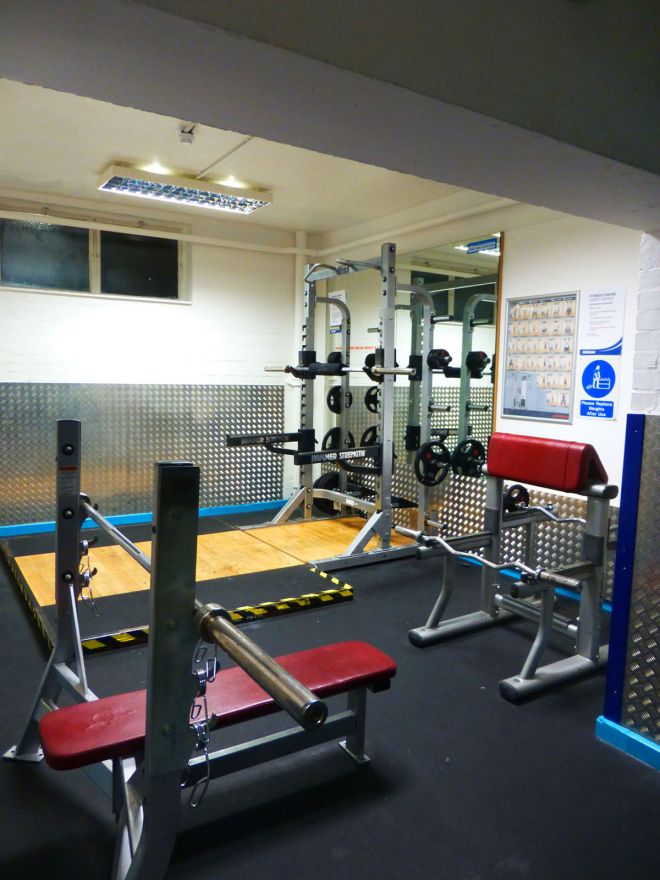 "My research concerns performance enhancing drug (PED) use in the gym-going population. The applications are numerous - I look at it from a harm reduction viewpoint, and that is what my research focuses on. With this in mind, I have worked on the Safe You project, funded by the EU ERASMUS+ programme, which aims to educate young and new gym goers about PEDs in a non-judgemental manner from a harm-minimisation perspective. Being able to utilise the theoretical knowledge in a practical manner through a big European project has been a real privilege as a PhD student!"
"My research concerns performance enhancing drug (PED) use in the gym-going population. The applications are numerous - I look at it from a harm reduction viewpoint, and that is what my research focuses on. With this in mind, I have worked on the Safe You project, funded by the EU ERASMUS+ programme, which aims to educate young and new gym goers about PEDs in a non-judgemental manner from a harm-minimisation perspective. Being able to utilise the theoretical knowledge in a practical manner through a big European project has been a real privilege as a PhD student!"
"Kingston University is a large, modern university. The resources available for students are numerous, and Kingston is a beautiful part of London. Particularly for graduate students, there are a huge number of extracurricular opportunities available which will enhance any student's CV should they wish to pursue them – I've been able to mentor a first year graduate student, as well as gain a national higher education teaching qualification. There are numerous sport societies here, and good amount of support for athletes - I was part of the Sports Performance Programme, which is fantastic for any athletes wishing to study at Kingston University."
"For any budding athletes, the sports ground at Tolworth is a huge, well-maintained resource. There is a gym on site which has equipment for anyone. There are also many facilities for students to have a quiet coffee and do some work on their laptop, or to hold meetings – the number of cafes with a large variety of food and drink to cater for anyone's taste and requirements is evidence of this. My personal favourite is the Picton Room."
"I have four supervisors – Professor Andrea Petroczi (my primary supervisor), Professor Phil Terry, Professor Declan Naughton and Dr Owen Spendiff. They all have different disciplinary interests, which benefits me greatly as I consider myself very much a multidisciplinary researcher. My primary supervisor, Professor Petroczi, provides me with many opportunities which are not only academic, but extracurricular in nature too. A good supervisor will help you develop holistically in my opinion. It's important to have a supervisor with whom you have a good working relationship with, and I certainly feel I have one with my supervisors!"
Karishma Jivraj, Faculty of Health, Science, Social Care and Education
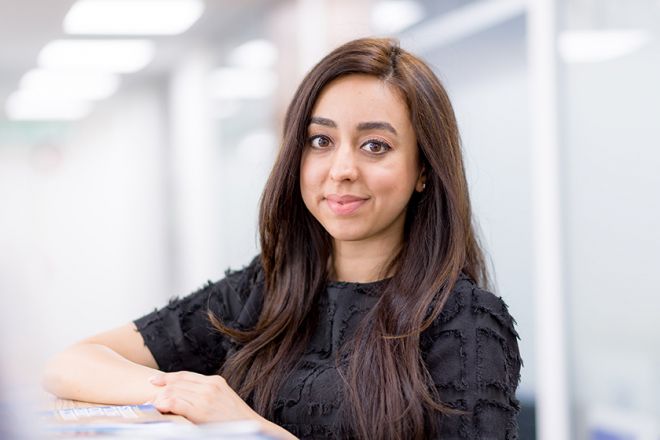 Karishma talks about the benefits of being in a joint faculty: "I have been able to develop the necessary transferable skills I need to pursue a career in research and academia. I've had the opportunity to attend research seminars relevant to my field as well as postgraduate taught classes which have been extremely helpful in building my academic profile. Collaborating with staff who possess extraordinary levels of expertise in their disciplines will greatly benefit my own PhD studies and future profession."
Karishma talks about the benefits of being in a joint faculty: "I have been able to develop the necessary transferable skills I need to pursue a career in research and academia. I've had the opportunity to attend research seminars relevant to my field as well as postgraduate taught classes which have been extremely helpful in building my academic profile. Collaborating with staff who possess extraordinary levels of expertise in their disciplines will greatly benefit my own PhD studies and future profession."
"From my undergraduate degree and dissertation in Psychology I knew I wanted to pursue research as a career. Working as a research assistant and clinical studies officer for other institutions such as Imperial College, Queen Mary University of London, the National Institute for Health Research, and the NHS gave me the exposure I needed to different research areas of mental health."
"My research, using mixed methods aims to explore therapeutic relationships, shared decision making and attitudes towards medication amongst service users and clinicians in the NHS. These topics have been widely explored in many physical health fields however have received little attention in mental health. The findings will hopefully help us learn more about NHS prescribing practices, decision making, and therapeutic relationships between clinicians and service users. I'm hoping that the results from the research will help to make practitioners and services aware of some of the possible reasons service users with mental illness may or may not take their medication. This research may be beneficial for service users in the future as it may help improve relationships between NHS clinicians and service users and inform future treatment planning."
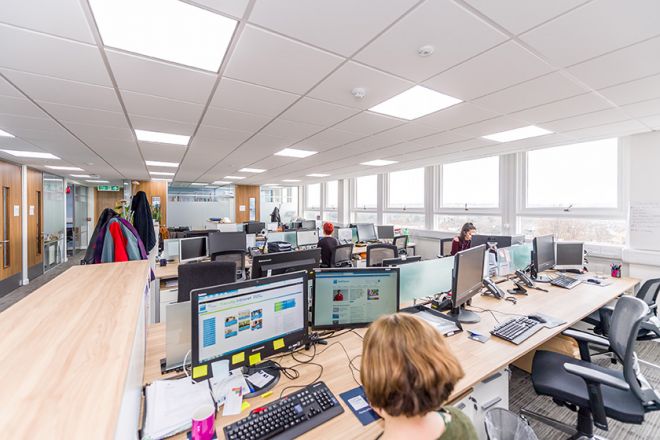 "One of my favourite things about Kingston is that it encourages academic and professional development. I've been awarded opportunities (and bursaries) to attend conferences in the UK and abroad, present my research and network with many experts in my field. The wide range of services for staff and students including library resources and facilities is also another great thing about studying here."
"One of my favourite things about Kingston is that it encourages academic and professional development. I've been awarded opportunities (and bursaries) to attend conferences in the UK and abroad, present my research and network with many experts in my field. The wide range of services for staff and students including library resources and facilities is also another great thing about studying here."
"Professor Mary Chambers, Professor of Mental Health Nursing and Director for the Centre for Public Engagement, and Dr. Iris Gault, Associate Professor of Mental Health Nursing, form my excellent supervisory team. I knew when I put my PhD proposal together that I wanted leading experts in mental health such as them to guide me through my studies. They have supported me throughout my research, including getting me through the lengthy ethics procedures and the terrifying MPhil - PhD transfer process. They stimulate me intellectually and push me so that I strive to do my best to ensure not only the success of the university but also my own."
Yousaf Khan, Pharmacy and Chemistry, Faculty of Health, Science, Social Care and Education
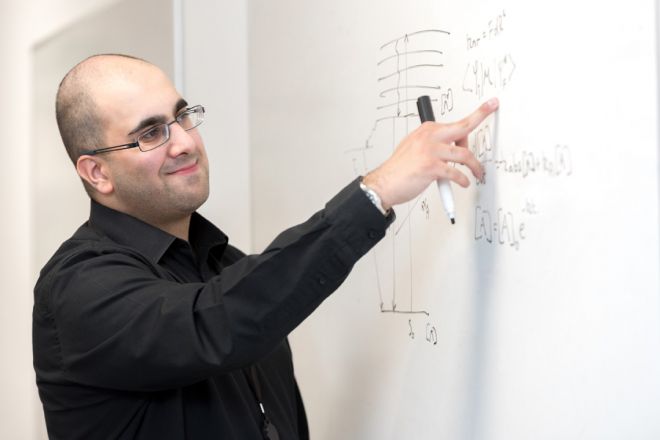
"It was during my MSc at UCL that I realised I wanted to make research my life career. Before my MSc I was always passionate about science and with this passion and new-found realisation, I decided my next step was to undertake a PhD. Having completed my undergraduate degree at Kingston in Chemistry, I had developed a strong connection with my lecturers (who would go on to become my supervisors). It was this, combined with the opportunity to do a project I was passionate about and to teach/supervise students, which led me to choose Kingston over several other institutions I had interviews with."
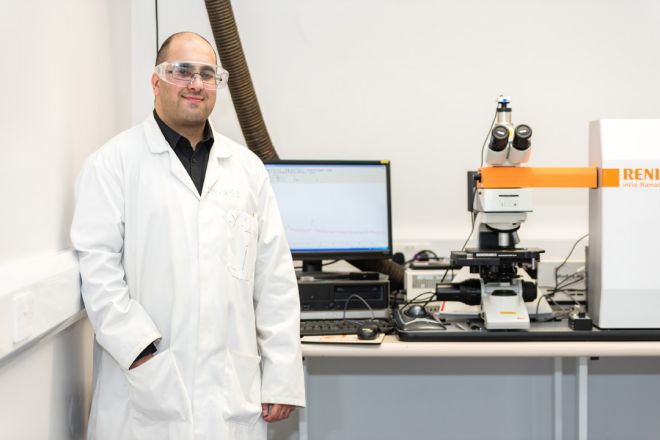
"Kingston University greatly supports its students, with student wellbeing a high priority, which has allowed me to fit in and feel welcomed by all members of staff. This, coupled with the fact that Kingston University's facilities provide the opportunity for high-quality research to be conducted, allows me to greatly enjoy my time studying at Kingston (both as an undergraduate and postgraduate)."
"I have very much enjoyed working with the outreach projects here within the Chemistry Department, as well as with the Royal Society of Chemistry. These have allowed me to carry out my love for teaching while continuing my studies. Other activities include student supervision and laboratory demonstrations for undergraduates, which I have found extremely rewarding."
"My supervisors Dr Richard Singer, Prof. Peter Foot and Dr Roman Kresinski, have been extremely helpful. They have guided me in the right direction when I have begun to stray and have allowed me to grow and develop as a researcher. They allow me to experiment and try new things that might otherwise be slightly outside my research focus. They have been supportive of my teaching roles and my work with the Royal Society of Chemistry."
George Reid, Performance and Screen Studies, Kingston School of Art
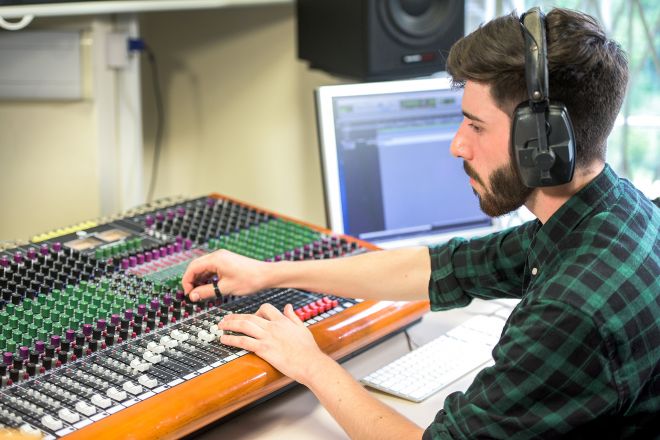 George talks about how his research has been developed and supported throughout his time at Kingston. "The opportunities and skillset I have gained at Kingston University are, for me, beyond value. Not only have I nurtured my research skills in relation to my broad and interdisciplinary academic interests, but I have greatly developed in my personal confidence and my ability to communicate my research to a range of different audiences. This combination of skills, conference funding, and training opportunities, for me, are key stepping-stones into an academic career."
George talks about how his research has been developed and supported throughout his time at Kingston. "The opportunities and skillset I have gained at Kingston University are, for me, beyond value. Not only have I nurtured my research skills in relation to my broad and interdisciplinary academic interests, but I have greatly developed in my personal confidence and my ability to communicate my research to a range of different audiences. This combination of skills, conference funding, and training opportunities, for me, are key stepping-stones into an academic career."
"Becoming a research student was an organic process. During the final year of my undergraduate degree, I undertook a dissertation project as part of a core module. Having the opportunity to cultivate a body of academic writing on a chosen subject, with the enthusiasm and guidance given by the academic staff, really appealed to me and the end result of my work was satisfying. I was really attracted to the academic research path. After the fantastic supervision and support Kingston provided during my undergraduate degree, I eagerly chose to continue this relationship with Kingston University and further nurture my academic skillset through a masters. I don't regret a single moment."
 "At present, my research looks into videogame music fandom, and my PhD project analyses chiptune subculture (chiptune is the name given to early electronic videogame music) and its continued practice of musical composition in the style of these early videogame soundtracks. Specifically, my research explores the place of nostalgia in contemporary chiptune subculture through an interdisciplinary framework of musicology, fan studies, and critical theory. My research hopes to not only achieve its research goal, but also provide an analytical framework and model for videogame music and similar nostalgia-orientated subcultures."
"At present, my research looks into videogame music fandom, and my PhD project analyses chiptune subculture (chiptune is the name given to early electronic videogame music) and its continued practice of musical composition in the style of these early videogame soundtracks. Specifically, my research explores the place of nostalgia in contemporary chiptune subculture through an interdisciplinary framework of musicology, fan studies, and critical theory. My research hopes to not only achieve its research goal, but also provide an analytical framework and model for videogame music and similar nostalgia-orientated subcultures."
"Kingston's academic staff are highly respected, and it has been a pleasure to work with many of them during my studies. I consider the academic staff to be the best part about Kingston University. Kingston also boasts many extracurricular activities, resources, and student opportunities."
"Professor Isabella van Elferen has overseen my academic projects since the final year of my undergraduate degree. Isabella's guidance in research and academic writing is utterly invaluable and I am indebted to her for the never-failing support she has provided over the years. I am truly grateful to be able to continue to work with her through my PhD. Dr Will Brooker I have had the pleasure of meeting since beginning my PhD. Dr Brooker is my secondary supervisor and his knowledge on audience studies is a great resource for my research, and I am really enjoying working with him."
Meghan Rolfe, Psychology, Faculty of Business and Social Sciences
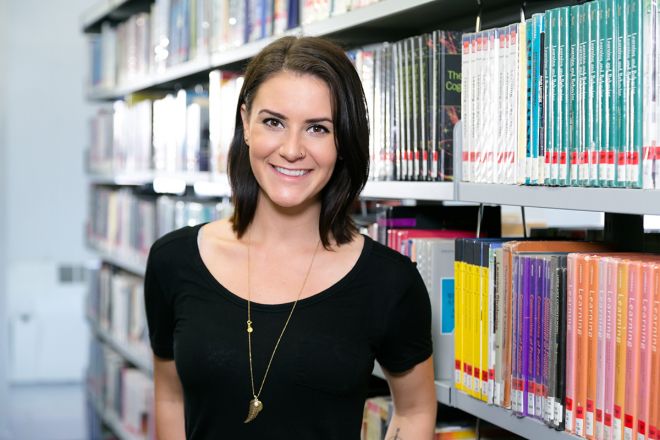 Meghan talks about the transferable skills she has acquired at Kingston and the opportunities to present her research that Kingston has given her. "Throughout my degree I have cultivated numerous transferable skills. These skills include critical thinking, problem solving, self-management, as well as the ability to design, implement, analyse and effectively report research studies. I have had the opportunity to present my research at two significant international psychology conferences— organised by the American Psychological Association and the British Psychological Society—both of which I was able to attend by being awarded with a bursary from Kingston University. I have also had the opportunity of running an exhibit at the Science Museum in London in which we utilised the Tobii Glasses Eye Tracker and analysed participants' eye movements whilst they completed visuo-spatial tasks. Overall, Kingston has provided me with a wide array of skills that will undoubtedly benefit me throughout my career."
Meghan talks about the transferable skills she has acquired at Kingston and the opportunities to present her research that Kingston has given her. "Throughout my degree I have cultivated numerous transferable skills. These skills include critical thinking, problem solving, self-management, as well as the ability to design, implement, analyse and effectively report research studies. I have had the opportunity to present my research at two significant international psychology conferences— organised by the American Psychological Association and the British Psychological Society—both of which I was able to attend by being awarded with a bursary from Kingston University. I have also had the opportunity of running an exhibit at the Science Museum in London in which we utilised the Tobii Glasses Eye Tracker and analysed participants' eye movements whilst they completed visuo-spatial tasks. Overall, Kingston has provided me with a wide array of skills that will undoubtedly benefit me throughout my career."
"My experience with Kingston University actually began in 2009 when I was an international exchange student completing a semester abroad during my BA degree. I am Canadian and Kingston University was connected to my university back home, which was initially how I chose this School. However, I fell in love with the town and once I finished my MA, I decided to move back to Kingston to begin my PhD. The town is incredible; it is so close to central London but far enough removed that it maintains a community feel."
"The focus of my research is psychological resilience which can be understood as a dynamic, contextualised process that involves the ability to adapt to hardship and successfully overcome adversity. My thesis utilises a mixed-methods design which explores resilience and identifies how lesbian, gay and bisexual people continue to thrive despite adversity. The goal is to produce findings that can subsequently be used to design an intervention to promote resilience. Overall, the main aim of my research is to place greater focus on the strengths found within marginalized groups and to help steer the dialogue away from its current problem-focused paradigm. This in turn will help advocate for the equality of LGBTQ people as well as specifically highlight and promote the resilience that can be found within the lesbian population."
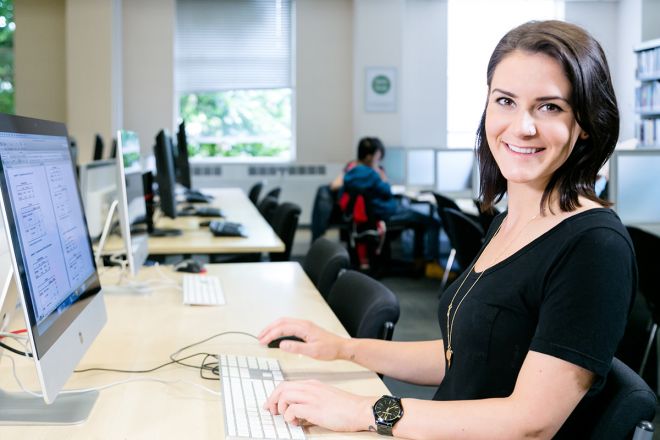 "My favourite part of studying at Kingston is the sense of family I have with my fellow psychology PhD researchers. Although we work independently, there is always a feeling that we are in this together and we unconditionally support one another."
"My favourite part of studying at Kingston is the sense of family I have with my fellow psychology PhD researchers. Although we work independently, there is always a feeling that we are in this together and we unconditionally support one another."
"I am a member of the Social Psychology Research Group at Kingston University which explores current social and political issues. We meet on a regular basis to discuss potential research projects, receive constructive feedback about our work, as well as conceptually explore up-to-date topics in terms of identity, intergroup relations and ideology."
"My lead supervisor is Professor Adrian Coyle who is well-known researcher in qualitative psychology; his research interests that are parallel to my own include identity and sexuality. My second supervisor is Professor Phil Terry who specialises in the psychology of alcohol and drug use/perceptions with the use of quantitative methods. My supervisors have a tremendous amount of experience and endless publications amongst them; furthermore, I greatly benefit from their contrasting research method specialities as I am able to learn both techniques. My supervisors continuously push me intellectually, while helping me foster countless skills as a young researcher. Their support and constant motivation propels me forward while making my experience as a PhD student challenging, yet immensely enjoyable."
Max Pearson, Faculty of Engineering, Computing and the Environment
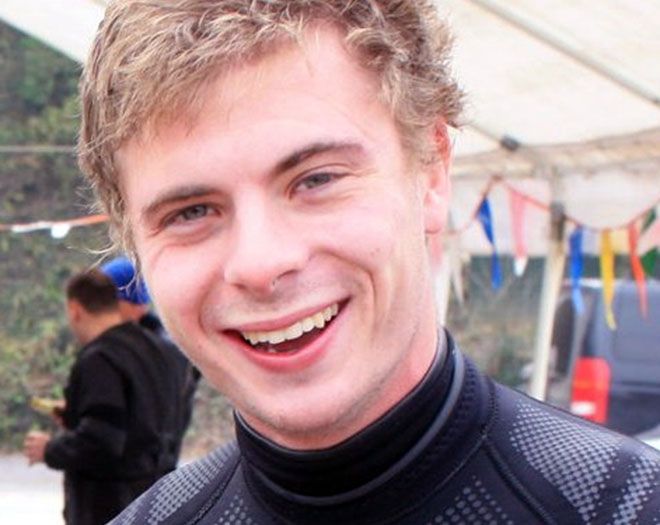 Max talks about the transferable skills he has acquired at Kingston: "Kingston has a lot to offer for research students with good links to other universities as well as to industry. This for me was ideal and it has helped me progress my PhD research in ways that I did not previously foresee. I have not only learnt what it takes to be a PhD researcher in terms of work, but also many other transferable skills that I have no doubt will help me in my career as well as my own personal satisfaction of life.
Max talks about the transferable skills he has acquired at Kingston: "Kingston has a lot to offer for research students with good links to other universities as well as to industry. This for me was ideal and it has helped me progress my PhD research in ways that I did not previously foresee. I have not only learnt what it takes to be a PhD researcher in terms of work, but also many other transferable skills that I have no doubt will help me in my career as well as my own personal satisfaction of life.
"I decided to study at Kingston during my undergraduate studies as I wanted to be close to London and at a university that was highly regarded for engineering. After my undergraduate degree, I was approached for jobs and was also offered the chance to continue the work I did for my dissertation at PhD level. I decided that for me research was where my heart was.
"Kingston has a lot to offer in terms of facilities and support as well, and not just that it has a large social scene with the possibilities of joining clubs that will give you further skills that will help you in whatever you chose to do in your future.
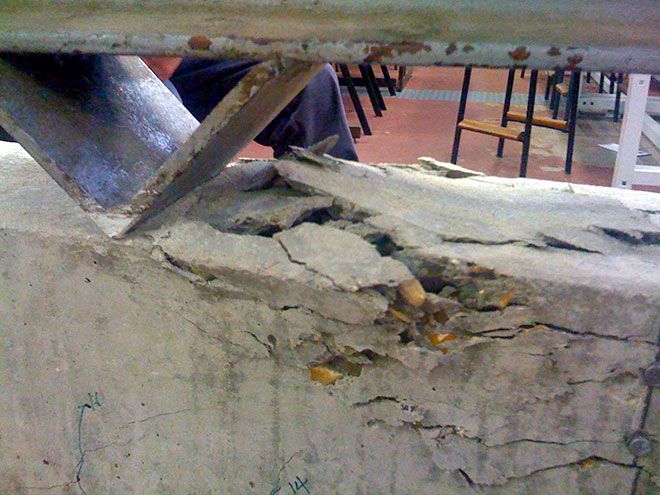 "I am researching a new kind of reinforcement bar, which could be used as an alternative to steel. There are a few FRPs (fibre reinforced polymers) – glass (GFRP), basalt (BFRP) and carbon (CFRP); and I specialise in BFRP. I study it in relation to its potential to be able to tension it ie pre- and post-tensioning which can be used for large structures, such as bridges and high buildings, as well as its behaviour both structural characteristics and chemical. BFRP is twice as strong as steel and six times lighter, as well as having little or no corrosion affects.
"I am researching a new kind of reinforcement bar, which could be used as an alternative to steel. There are a few FRPs (fibre reinforced polymers) – glass (GFRP), basalt (BFRP) and carbon (CFRP); and I specialise in BFRP. I study it in relation to its potential to be able to tension it ie pre- and post-tensioning which can be used for large structures, such as bridges and high buildings, as well as its behaviour both structural characteristics and chemical. BFRP is twice as strong as steel and six times lighter, as well as having little or no corrosion affects.
"My director of studies (Dr Ted Donchev) is a leading researcher in the field of structural polymers and my other supervisor Professor Mukesh Limbachiya is a leading voice in sustainability in the construction industry. Their combined efforts have allowed me to progress as a researcher and write in journals as well as conference papers. The University has allowed me to attend those conferences in order to continually help me progress as a researcher in structural engineering."
Andrea Salin, Faculty of Engineering, Computing and the Environment
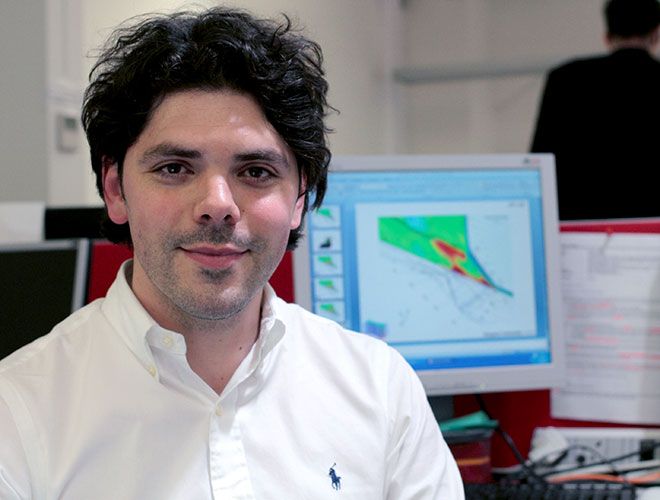 Andrea talks about opportunities that he has had for international collaboration: "We have started international collaboration with world-leading research scientists from Russia and China. The contribution of these top researchers has further enhanced the quality of our research and raised the international visibility of our group as well as Kingston University."
Andrea talks about opportunities that he has had for international collaboration: "We have started international collaboration with world-leading research scientists from Russia and China. The contribution of these top researchers has further enhanced the quality of our research and raised the international visibility of our group as well as Kingston University."
"After obtaining my MSc in Aerospace Engineering with distinction, I applied for a PhD studentship offered by Kingston University. The project, supervised by Dr Yufeng Yao and Dr Sing Lo, involves numerical flow analysis of supersonic inlets (e.g. SCRAMJET).
"Accurate predictions of three-dimensional crossing shock wave and turbulent boundary layer interactions are of particular importance in the design of high-speed vehicles. Such flows can generate intense heat transfer rates and pressure levels, and complex large-scale unsteady separated flows which can largely increase drag. In general, the shock-wave boundary layer interaction phenomena occur in a wide range of high-speed aerodynamic flow problems, such as supersonic/hypersonic air intakes, propelling nozzles at off-design conditions and deflected flow controls.
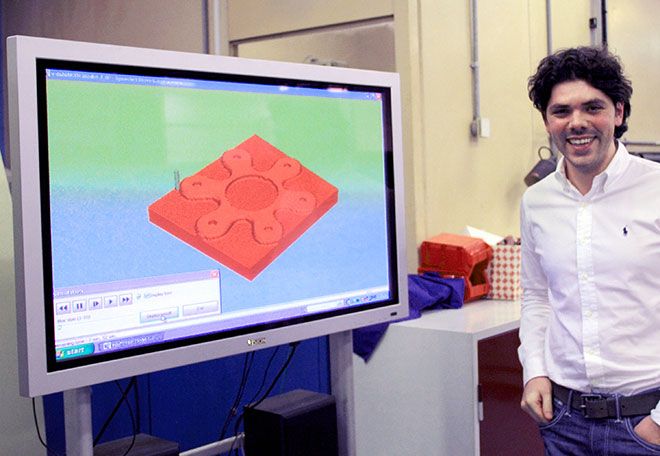 "Our efforts to advance the current level of research in this field are hence tailored to improve numerical predictions, focusing on turbulence modelling effects, unsteadiness mechanisms, and fluctuating loadings (dynamics and thermal) on the walls. Also, inherent flow structure and topologies are considered in detail.
"Our efforts to advance the current level of research in this field are hence tailored to improve numerical predictions, focusing on turbulence modelling effects, unsteadiness mechanisms, and fluctuating loadings (dynamics and thermal) on the walls. Also, inherent flow structure and topologies are considered in detail.
"This PhD studentship also grants me the opportunity to teach computational fluid dynamics (CFD) as a GTA (graduate teaching assistant) to students on BSc and MSc courses. I am also a PhD student representative of Roehampton Vale engineering campus.
"Weekly supervision has been effectively provided by my supervisors throughout these years. My director of studies is always keen to support me constructively by sharing his outstanding experience and technical background.
"We have started international collaboration with world-leading research scientists from Russia and China. The contribution of these top researchers has further enhanced the quality of our research and raised the international visibility of our group as well as Kingston University.
"Overall, the experience gained here at Kingston University is simply great and I would recommend it to anyone who is willing to stand out from the crowd in an international scenario."
Sarah Zaidan, Kingston School of Art
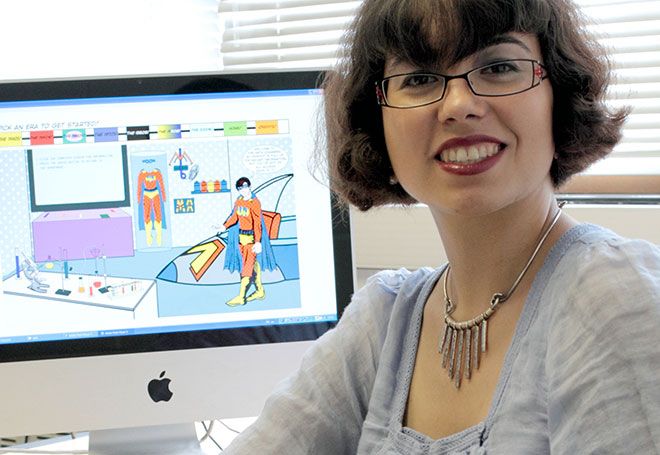 Sarah talks about the stimulating research environment created by staff at Kingston: "The staff possess a phenomenal level of knowledge and expertise in their respective disciplines and they strive to create an intellectually and creatively stimulating environment for research students."
Sarah talks about the stimulating research environment created by staff at Kingston: "The staff possess a phenomenal level of knowledge and expertise in their respective disciplines and they strive to create an intellectually and creatively stimulating environment for research students."
"I came to Kingston University to pursue a masters degree in Illustration and Animation because the teaching philosophy of the University was complementary to my personal ethos as an artist. After doing so, I decided to undertake a PhD in the same discipline, for the same reasons.
"The research environment of the Design Research Centre and the Visual and Material Culture Research Centre (due to the interdisciplinary nature of my research, I am affiliated with both) is positive and invigorating.
"I have received support and supervision that has been truly exemplary. My supervisory team has, since I began my research, provided me with guidance, advice, suggestions and direction that have been nothing less than crucial. My research is thorough, strong and original because of this. As a practice-based researcher, my project has required me to learn programming code. My supervisory team aided in procuring the necessary tutorial support for me to accomplish this. Through Kingston University, I have also received training towards my future ambitions as a teacher in higher education and valuable research student training sessions.
"I have made liberal use of the Learning Resource Centres at both Knights Park and Penrhyn Road during the course of my research; I have consistently found their content beneficial and comprehensive. I have also undertaken digital media modules in order to learn the programming skills my research required; I found the computer labs at Penrhyn Road exceptional.
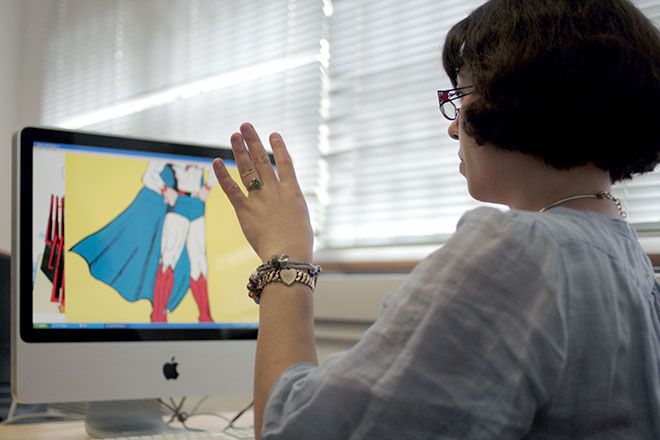 "The location of Kingston University is perfect. While I deliberately reside less than half-an-hour away from the Knights Park and Penrhyn Road campuses, my research has often required me to venture into London for conferences and exhibitions. Kingston's location has made this very straightforward.
"The location of Kingston University is perfect. While I deliberately reside less than half-an-hour away from the Knights Park and Penrhyn Road campuses, my research has often required me to venture into London for conferences and exhibitions. Kingston's location has made this very straightforward.
"As an international student, I feel valued and supported at Kingston University. The International Student Advisory Centre, in particular, has consistently guided and supported my visa applications, as well as answering any questions I may have. My experience as a research student has been thoroughly positive in every way."
Contact us
- For queries relating to research degree admissions, contact the relevant faculty.
- For non-admissions enquiries regarding research programmes, email Rachel Graham.
- How to get to Kingston University
Contact us
- For queries relating to research degree admissions, contact the relevant faculty.
- For non-admissions enquiries regarding research programmes, email Rachel Graham.
- How to get to Kingston University
